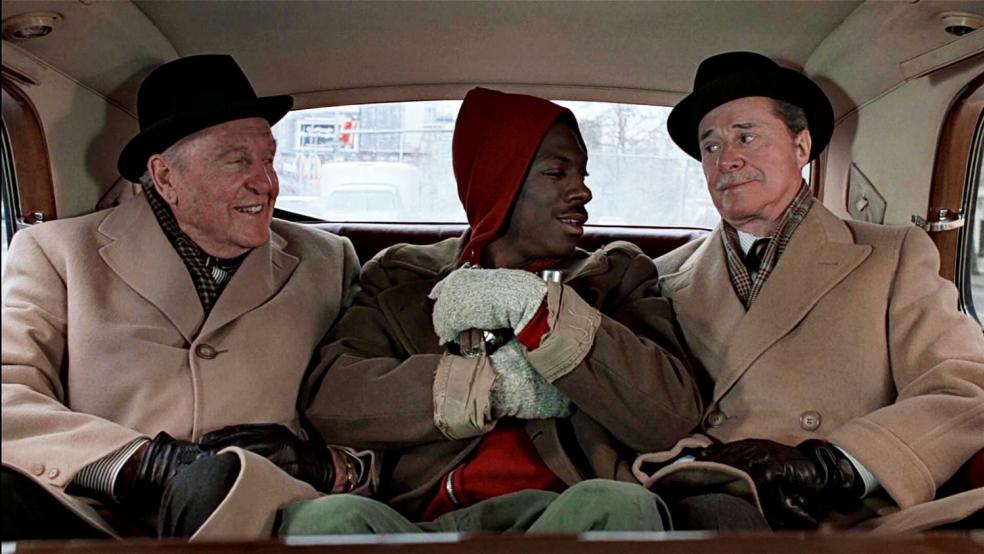For economists, one of the greatest scenes in the history of film is at the end of the 1983 picture, “Trading Places.” It helps Bruce Bartlett  explain today’s congressional budget debate.
explain today’s congressional budget debate.
In the movie, the Duke brothers (actors Ralph Bellamy and Don Ameche) are commodities traders who plan to corner the market in orange juice futures. They have what they believe is an advance copy of a secret government report showing that prices will go much higher.
Actually, it’s a phony report that two fired Duke employees (actors Dan Aykroyd and Eddie Murphy) have substituted for the correct one, which actually shows no change in orange juice prices. They concoct a scheme to both bankrupt the Dukes while making themselves rich.
The scene opens with the Duke trader buying orange juice futures heavily. Others join in and the price rises rapidly. Meanwhile, Murphy and Aykroyd are also on the trading floor waiting for the right moment to strike.
When they think the price has risen enough, they begin selling short. When the true government report is issued, the price collapses. When it has fallen enough, Murphy and Aykroyd start buying to cover their short position. In the end, the Dukes lose everything and the boys make millions.
In today’s budget debate, a few intractable congressional Republicans are the Duke brothers. They think they have the president and congressional Democrats over a barrel; they will have to accept GOP demands to defund the Affordable Care Act, otherwise known as “Obamacare,” or they will refuse to either fund the government past the current fiscal year, which ends on Sept. 30, or raise the debt limit, which will expire sometime in October.
RELATED: PREPARING FOR WAR ON THE MAINLAND OVER OBAMACARE
Failure to fund the government will lead to a government shutdown and failure to raise the debt limit will cause the Treasury to default on the debt, which most economists believe will roil financial markets and raise interest rates.
Republicans think that either prospect is too terrible for the White House or Democrats to contemplate. Therefore, they will be forced to agree to Republican demands.
But Obama and congressional Democrats think they are in the same position as Aykroyd and Murphy and are just waiting for the right moment to sell. That is why we have heard little from them about the ongoing budget negotiations, which at this point are taking place almost entirely within the House Republican conference, with sane pragmatists on one side and suicidal bomb throwers on the other—Senate Majority Leader Harry Reid calls them “anarchists.”
The pragmatists believe that the Obamacare train left the station a long time ago and it is simply futile to try and stop it from going into effect at this late date. They think the bomb throwers, who have already voted 40 times to repeal it, are ideologues pandering to ignorant fools in the so-called Tea Party and have no clue as to how the legislative process works.
The pragmatists are, by and large, among the more senior members of the GOP—the Tea Party crowd for the most part have only been around for 2 ½ years—and they remember too well how badly it went for them when they shut down the government in 1995 unless Bill Clinton agreed to slash Medicare spending.
Clinton won the shutdown fight hands down. Republicans took all the blame for the shutdown and were forced to retreat without getting anything in return. A new CNN/ORC poll shows that Republicans would again suffer most of the blame.
Republican pragmatists also know that even threatening to default on the debt is like using nuclear weapons on yourself to get your enemy to surrender. In short, it’s completely nuts.
This explains why Obama and congressional Democrats are just standing there like Murphy and Aykroyd in the orange juice trading pit of the New York Mercantile Exchange, seemingly oblivious to all the action going on within the Republican Party.
RELATED: BIG BUDGET RISK AS CONGRESS SAYS SEE YOU IN SEPTEMBER
While they appear passive, in fact they are just waiting for the right moment to step in and save the GOP from itself. Sooner or later they expect House Speaker John Boehner to come to them, hat in hand, begging for Democratic votes to pass some sort of budget to prevent a government shutdown and raise the debt limit.
Boehner probably has enough Republican votes to pass a budget and a debt limit increase together with the Democrats. But a majority of House Republicans will undoubtedly vote “no.”
While in principle this outcome is virtually preordained and can be implemented on short notice, there are three complications.
First is what price Democrats will demand for saving Republicans from the childish behavior of their Tea Party members. They may feel that simply embarrassing the Republicans is sufficient satisfaction, but some party liberals may demand a pound of flesh as well and threaten to vote with the Tea Party unless they get it. But the leadership will explain that splitting the GOP pragmatists from the crazies and creating a new bipartisan governing coalition is more important.
The second problem is that Speaker Boehner may lose what little control he has over his members and be threatened with a palace coup. Possibly the only way he can avoid being deposed will be to agree to retire at the end of this Congress, which has already been rumored.
Third is what will happen to any pragmatist voting with Democrats on the budget. Probably all have safe seats in the general election, but are nevertheless highly vulnerable to primary defeat by some Tea Party extremist, flush with right wing campaign money from the Koch brothers, the Club for Growth and other groups that enforce rigid ideological discipline in the GOP. The pragmatists may be writing their own political obituaries if they do the right thing.
At this point, it is too soon to say how all this will play out. But there is a severe time constraint. Republicans should remember that by the time the Dukes figured out what was going on, the closing bell was ringing.






